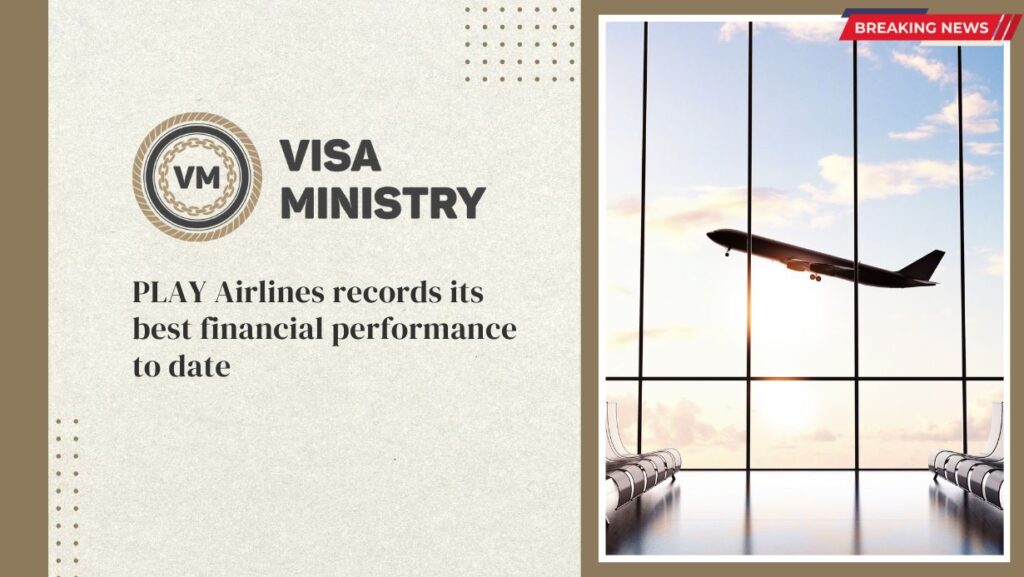The low-cost Icelandic airline PLAY reported a profit of USD 5.2 million for the third quarter of 2023, an 84% increase over the same period the previous year in its financial reports. PLAY’s most successful financial quarter to date was the third quarter of 2023, with the addition of four planes and thirteen destinations.
The CEO of PLAY, Birgir Jónsson, stated: “We are all quite happy of our third-quarter financial and operational performance, and particularly of the fact that PLAY turned a profit of 5.2 million USD—the first quarterly profit since our first flight in June 2021. The company’s operational profit climbed tenfold compared to the same quarter last year, while revenues increased by 84% and the number of passengers increased by 74%. These are impressive results that attest to a well-functioning business strategy and a talented team of professionals.
Even with a large capacity increase, there was a notable gain in revenues and load factor.
In Q3 2023, PLAY conducted flights to 33 locations in Europe and North America, with a 71% increase in capacity, expressed in available seat kilometres (ASK), over Q3 2022. From 85% in Q3 2022 to 88.4% in Q3 2023, the load factor increased by 3.4%. Compared to Q3 2022, when PLAY carried 311 thousand passengers, it flew 540 thousand passengers in Q3 2023—a 74% increase.
Unit revenue (RASK) increased by 9% while revenue climbed by 84%. The fact that load factor and unit revenue have improved year over year shows how well-established PLAY has grown in its major regions.
24% of all passengers flown in Q3 2023 were from Iceland, with 33% arriving in Iceland and 43% connecting (via VIA). The load factor on routes to and from North America was 92% throughout the quarter, despite a 4% year-over-year increase in via traffic. With an 88% increase in passengers flying to and from North America and a 66% increase in passengers flying to and from Europe, the number of passengers flown grew by 74% year over year.
In comparison to Q3 2022, VIA traffic rose in terms of both passenger count and percentage of overall traffic due to improved network connection, increasing knowledge of PLAY in international markets, and robust demand from U.S. consumers. In comparison to Q3 2022, all of these variables, together with the introduction of bundled pricing in February, contributed to higher yields from VIA passengers.
With 85.1% of flights arriving on schedule in Q32023, PLAY maintained its high operational performance. This is a substantial improvement over the airline’s primary rivals.
Q3 Financial Results 2023
With revenues of USD 110.2 million in Q3 2023 compared to USD 59.9 million in Q3 2022, PLAY’s net profit for the quarter was USD 5.2 million, an improvement of USD 8.1 million from the net loss of USD 2.9 million in Q3 of last year.
With enhanced product offerings including bundled fares, which debuted in February, and other auxiliary items, PLAY has placed a strong emphasis on growing ancillary revenue. Compared to Q3 2022, when it was USD 43, ancillary yield per passenger climbed by 35% to USD 58 in Q3 2023. The total amount of auxiliary revenue so far in 2022 is 150% less than that of this year.
With total operating costs of USD 82.1 million in Q3, including depreciation, the unit cost per available seat kilometer (CASK) was 5.3 US cents, down 2% from the same period the previous year. Ex-fuel CASK was 3.4 US cents and grew 11% annually as a result of one-time maintenance costs and inflation. For the entire year, PLAY projects its Ex-Fuel CASK to be approximately 3.7 USD cents.
The quarter’s financial revenue and expenses came to a negative $6 million, of which USD 4.6 million was attributable to lease liabilities’ interest costs.
At the end of the quarter, PLAY’s total assets were USD 493.8 million, up from USD 331.5 million at the end of 2022. Over that time, the business flew ten aircraft. The majority of the USD 27.9 million in trade and other receivables was made up of unpaid ticket purchases from the acquirer. Due to seasonality, deferred income declined over the period, ending September at USD 40.7 million as opposed to USD 82.4 million at the end of June. Due to seasonality, the unwinding of the working capital position during the third quarter resulted in less cash than in the second. The company had USD 39.2 million in cash at period’s end, including restricted cash. Equity totaled USD 25.5 million at the conclusion of the quarter. There is no foreign debt that bears interest for the company.
Jónsson goes on, “PLAY has been growing at a very rapid rate as we have been adding more Players to our staff, growing our fleet, and developing our network. Our ability to raise both our unit revenues and ancillary revenues concurrently is a noteworthy accomplishment because growth is costly. This has led to a solid net profit and a sound financial position.
“Instead of expanding as much as we had planned, we will concentrate on streamlining and stabilizing our operations and boosting profitability until we start our next growth phase in 2025, which will include more aircraft—some of which have already been secured—and a denser and more expansive network.”
“Our team has been able to maintain a highly competitive unit cost, which is a real challenge in the current inflationary business environment, but it is something that is absolutely critical for our success,” the team said, keeping a laser-like focus on our cost base. I genuinely want to express my gratitude to each and every one of the amazing people that comprise the PLAY team for their amazing effort, and I firmly believe that nothing can stop them from playing to win in the future.
A digital onboard passenger self service through passengers’ personal devices has been introduced by PLAY on a few aircraft. Space Seats are aisle or window seats at the front of the aircraft with extra legroom and no neighbors because the middle seat is blocked by a cozy side table. As a result, there are 200 seats instead of 214 seats per Airbus A321neo aircraft during the low season, which lowers labor costs because fewer crew members are required. When seasonal demand returns, the product is simple to remove and boosts auxiliary revenue.
Prospects
The end-of-summer information that PLAY released at the end of September does not alter the company’s outlook for the entire year. According to the forecast, there will be about 1.5 million passengers carried in 2023, and EBIT will be almost USD 10 million negative. In 2023, PLAY is expected to bring in a total of about USD 280 million in revenue.
Source- Travel daily
Link- https://www.traveldailymedia.com/play-airlines-achieves-most-successful-financial-results-to-date/

